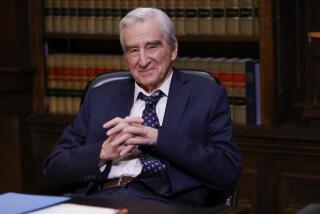SIGN-OFF FOR A TV PARTNERSHIP
Things happen that you thought impossible. A President resigns. TV networks change hands like hunks of real estate. Cary Grant dies. And now. . . .
Link without Levinson.
Richard Levinson, who died Thursday of an apparent heart attack at age 52, and his partner, William Link, formed one of TV’s most respected, talented, thoughtful, prolific and successful writing/producing teams.
We tend to notice stars, not creators. So viewers may ultimately feel the loss of Dick Levinson without ever realizing it. Along with Link, he was one of TV’s gifted elite, a mainstreamer who swam better than the rest.
Rodgers found Hammerstein after Hart, so Link will have writing life after Levinson, surely. But it won’t be the same.
Friends since seventh grade, Levinson and Link wrote books and got a Tony nomination for the Broadway musical “Merlin.” TV was their principal stage, though.
Levinson and Link were the point at which art and popularity merged. Just look at this partial list of their credits:
The series “Murder, She Wrote,” “Columbo,” “McCloud” and “Mannix,” and TV movies such as “My Sweet Charlie,” “That Certain Summer,” “The Execution of Private Slovik” and “Crisis at Central High.”
Levinson was a pragmatist. You have to be to flourish in TV. But he was also an idealist. “That theater (meaning TV) seats 50 to 60 million people a day, and shows that seat only 10 million are considered failures because of the economic structure of TV,” he lamented in his smooth, velvety voice last December on Michael Jackson’s KABC radio show.
The statement was prophetic, for the most recent Levinson and Link creation, an ambitious-but-flawed series about police reporters titled “Hard Copy,” was recently put on hiatus because it didn’t fill enough seats to satisfy CBS.
Ironically, “Hard Copy” capped a Sunday night on CBS that also includes that Levinson and Link creation, the smash hit “Murder, She Wrote.”
Levinson wasn’t ashamed of being commercial while also being good. With “Columbo,” their wonderful police series about a shleppy detective who inevitably caught off-guard and outsmarted brilliant, egocentric killers, Levinson and Link made formula TV soar. If creating a character whose name was to become a generic reference point for a whole genre of TV wasn’t genius, what is?
Creatively, though, Levinson and Link made their greatest TV contributions in movies.
“My Sweet Charlie,” their 1970 story that matched a white unwed mother with a black eastern lawyer, was a landmark in interracial relationships for TV. Two years later, “That Certain Summer” made TV history with its sensitive, unstereotypical story of two gay lovers, one of whom must tell his son about his homosexuality. Until then, gays were either invisible or the swishy butts of jokes on TV.
Levinson’s and Link’s TV masterpiece was “The Execution of Private Slovik” in 1974, a profoundly disturbing and moving version of William Bradford Huie’s book about the only American GI to have been executed for desertion since the Civil War. This production marked another collaboration (following the previously cited movies) with director Lamont Johnson and ended with a sequence--Eddie Slovik’s execution by firing squad--that was TV at its most chillingly eloquent.
Few in TV can create programs that appeal to the masses, and fewer still can appeal to the masses and still be literate. The latter describes Levinson and Link.
“It is not against the law for us to do things that are worth watching,” they wrote in “Off Camera,” their recently published collection of interviews with the movers and shakers of prime-time TV. “Even if we accept that our role is essentially to entertain, there is always the tantalizing possibility that we can create quality entertainment.”
Michael Jackson asked Levinson and Link if they could write comedy.
“Not really,” Link replied.
“Not intentionally,” Levinson added.
But Levinson had a sense of humor. “Separately, we’re each profoundly talented,” he joked about his partnership with Link, “but we enjoy working together.”
Elsewhere in “Off Camera,” Levinson and Link recall a Writers Guild of America panel discussion on how to improve the quality of TV. Later, a writer who attended was asked by one who didn’t what the solution was. His colleague replied: “Write better. Pass it on.”
Levinson always did write better. And he passed it on.
More to Read
The complete guide to home viewing
Get Screen Gab for everything about the TV shows and streaming movies everyone’s talking about.
You may occasionally receive promotional content from the Los Angeles Times.






